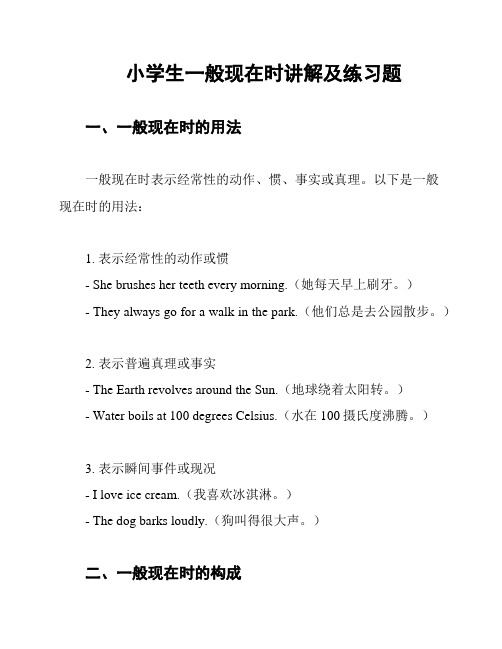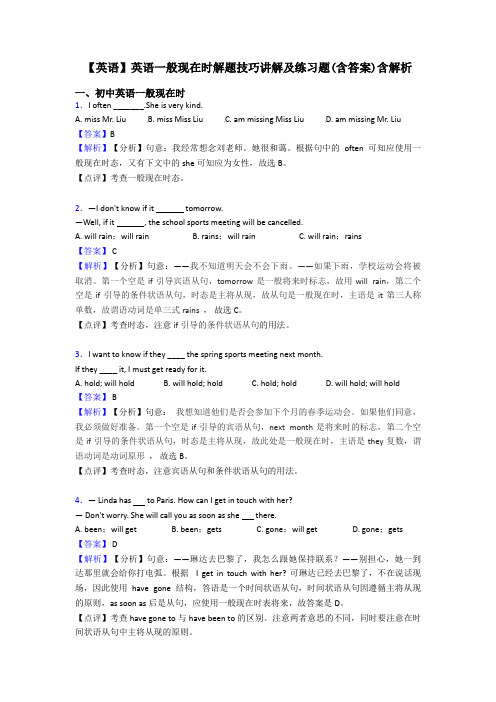一般现在时讲解及练习题
(英语)英语一般现在时解题技巧讲解及练习题(含答案)及解析

(英语)英语一般现在时解题技巧讲解及练习题(含答案)及解析一、初中英语一般现在时1.—Jill is the best singer in my class.—Yes. I think so. No one else ______ so well.A. singsB. sangC. will singD. is singing【答案】 A【解析】【分析】句意:——吉尔在我们班唱歌最好。
——是的,我也这样认为。
没有其他人能唱的如此好了。
根据上句Jill is the best singer in my class.描述的是吉尔的能力,用一般现在时,所以下句也该是一般现在时态。
故选A。
【点评】考查一般现在时态。
注意识记一般现在时态的用法。
2.The children will climb the mountain if it________ tomorrow.A. won't rainB. didn't rainC. isn't rainingD. doesn't rain【答案】 D【解析】【分析】句意:如果明天不下雨,孩子们会去爬山。
if 引导的条件状语从句遵循主将从现的原则,主句用一般将来时,从句用一般现在时,从句是一个否定句,含有实义动词rain的否定句,要借助助动词don't/doesn't构成,主语是it,助动词用doesn't,故选D。
【点评】考查if引导的条件状语的时态。
注意句子涉及到if引导的条件状语从句的用法。
3.Will you get wet if I ______ the experiment?A. will doB. doC. doesD. did【答案】 B【解析】【分析】句意:如果我做实验,你会淋湿吗?if引导的条件状语从句,时态是主将从现,从句主语是 I,故谓语是动词原形,故选B。
【点评】考查时态,注意f引导的条件状语从句,时态是主将从现的用法。
(完整版)一般现在时态讲解及练习(精简版,错题版)

一般现在时态一、一般现在时的用法1)表示经常性、习惯性的动作或存在的状态。
通常与副词sometimes, often, usually, always, every day (year, month ), once (twice, three times) a day,等等频率副词(时间状语)连用。
e。
g。
They usually go to school by bike。
I take the medicine three times a day. 实义动词表示“动作”She helps her mother once a week.Mary’s father is a policeman.There are 50 students in my class. Be动词表示“状态”He is very busy now。
be 、do不能放一起,如果非要放一起,do后要加ing, 变成现在进行时。
2) 表示主语的特征、性格、爱好等。
e.g。
I work hard.I like watching TV.3) 表示客观真理e。
g. There are seven days in a week.The moon moves round the earth。
The sun rises in the east and sets in the west every day。
Tomorrow is Tuesday。
二、一般现在时的句子转换:三、一般现在时的结构:“主语+谓语+其它”,有时为了起强调作用,时间状语也可提前.三单变化:1)多数在动词后+s :play - plays like —likes ask———asks work———works get---gets stay-——stays2)以字母s, x, ch, sh或o结尾的动词,+-es:watch-——watches wish———wishes fix———fixes do——-d oes go---goes pass-—-passes3)以“辅音字母加 - y”结尾的动词,要先变y为i+-es。
一般现在时知识讲解与专项练习(讲义)-人教PEP版英语六年级上册

六年级上册一般现在时知识讲解与专项练习一、一般现在时知识点【No. 1】概念:1.表不事物或人物的特征、状态。
如:The sky is blue.天空是蓝色的。
2.表示经常性或习惯性的动作。
如:I get up at six every day.我每天六点起床。
3.表示客观现实。
如:The earth goes around the sun.地球绕着太阳转。
【No.2】时间标志性词:every ... (every day/week/Sunday...)on+星期几(on Mondays/Tuesdays..)频度副词(always, usually often sometimes, rarely, seldom, never)【No.3】结构:①动词原形I like apples.②动词单三形式He plays football.③be动词I am a boy.有be无动(动:实义动词)①肯定句:主语+be+其他He is an English teacher.②否定句:主语+be not+其他He is not an English teacher.③一般疑问句:Be +主语+其他+...?Is he an English teacher?有动无be(动:实义动词)①肯定句:主语(非三单)+动词原形+其他I play football.主语(三单)+动词三单形式+其他He plays football.②否定句:主语(非三单)+don’t+动词原形+其他I don't play football.主语(三单)+doesn’t动词原形+其他He doesn't play football.③一般疑问句:Do+主语(非三单)+动词原形+其他?Do you play football?Does+主语(三单)+动词原形+其他?①肯定形式:主语十情态动词can/may+动词原形+宾语。
小学生一般现在时讲解及练习题

小学生一般现在时讲解及练习题一、一般现在时的用法一般现在时表示经常性的动作、惯、事实或真理。
以下是一般现在时的用法:1. 表示经常性的动作或惯- She brushes her teeth every morning.(她每天早上刷牙。
)- They always go for a walk in the park.(他们总是去公园散步。
)2. 表示普遍真理或事实- The Earth revolves around the Sun.(地球绕着太阳转。
)- Water boils at 100 degrees Celsius.(水在100摄氏度沸腾。
)3. 表示瞬间事件或现况- I love ice cream.(我喜欢冰淇淋。
)- The dog barks loudly.(狗叫得很大声。
)二、一般现在时的构成在一般现在时中,动词的变化相对简单。
1. 对于第三人称单数(He/She/It),动词要加-s或-es。
- He walks to school every day.(他每天走路去学校。
)- She eats an apple.(她吃一个苹果。
)- It runs fast.(它跑得很快。
)2. 对于其他人称(I/You/We/They),动词不变。
- I play soccer on weekends.(我周末踢足球。
)- You read books every night.(你每晚读书。
)- We go swimming in summer.(我们夏天去游泳。
)- They watch movies together.(他们一起看电影。
)三、练题请根据句意填入正确的动词形式。
1. My mother __________ (cook) dinner for us every evening.2. Tom and Lisa __________ (play) tennis on Saturdays.3. The sun __________ (rise) in the east.4. We __________ (study) English at school.5. Dogs __________ (bark) when they see strangers.1. cooks2. play3. rises4. study5. bark希望以上讲解和练习题对你有帮助!。
【英语】英语一般现在时解题技巧讲解及练习题(含答案)含解析

【英语】英语一般现在时解题技巧讲解及练习题(含答案)含解析一、初中英语一般现在时1.I often _______.She is very kind.A. miss Mr. LiuB. miss Miss LiuC. am missing Miss LiuD. am missing Mr. Liu【答案】B【解析】【分析】句意:我经常想念刘老师。
她很和蔼。
根据句中的often可知应使用一般现在时态,又有下文中的she可知应为女性,故选B。
【点评】考查一般现在时态。
2.—I don't know if it tomorrow.—Well, if it , the school sports meeting will be cancelled.A. will rain;will rainB. rains;will rainC. will rain;rains【答案】 C【解析】【分析】句意:——我不知道明天会不会下雨。
——如果下雨,学校运动会将被取消。
第一个空是if引导宾语从句,tomorrow是一般将来时标志,故用will rain,第二个空是if引导的条件状语从句,时态是主将从现,故从句是一般现在时,主语是it第三人称单数,故谓语动词是单三式rains,故选C。
【点评】考查时态,注意if引导的条件状语从句的用法。
3.I want to know if they ____ the spring sports meeting next month.If they ____ it, I must get ready for it.A. hold; will holdB. will hold; holdC. hold; holdD. will hold; will hold【答案】 B【解析】【分析】句意:我想知道他们是否会参加下个月的春季运动会。
如果他们同意,我必须做好准备。
第一个空是if引导的宾语从句,next month是将来时的标志,第二个空是if引导的条件状语从句,时态是主将从现,故此处是一般现在时,主语是they复数,谓语动词是动词原形,故选B。
一般现在时讲解与练习

一般现在时Present Tense一、概念:表示通常性、规律性、习惯性的状态或者动作(有时间规律发生的事件)的一种时间状态。
拆开来讲就是:时间:指动作发生在“现在”的时间段内。
那么,多长的时间才叫“现在”呢?一天?状态:一般现在时最容易迷惑的一个问题,就是拿不准什么叫“经常发生的动作或存在的状态”?这个问题要分三层来讲:1.“经常发生的动作”,比如每天起床、吃饭、上学,一个星期去几次超市或新华书店等。
这些事件中,有的是有规律的,有的是偶尔做几次。
这些都算经常发生的事件。
我们要告诉人们的,是这个动作经常发生,是一般的情况而不是具体的某一次。
2.事物存在的状态。
3.有些动作或状态是永恒的,比如长江向东流、地球绕着太阳转,比如谚语中举的事例、文学作品中描绘的事例,像“好马不吃回头草”等等二、基本用法:1.表示经常性或习惯性发生的动作。
如:I always get up at 7 o’clock in the morning.我总是在早上7点起床。
We often read books at school.我们在学校经常看书。
They usually have dinner at 6:00 in the evening.他们通常在晚上6点吃晚餐。
2.表示现在的状态或特征。
如:She loves English very much.她非常爱英语。
We are always at home on weekends.周末我们总留在家。
Tom is an exellent player.汤姆是一位优秀的运动员。
3.表示客观的现实。
如:The sun rises in the east.太阳从东方升起。
Summer comes after spring.夏天在春天的后面4.用在按计划、规定或安排发生的事情。
如:The plane leaves at 9:30.飞机9点30分起飞。
Tomorrow is Sunday.明天是星期天。
一般现在时练习题与讲解
一般现在时练习题与讲解一般现在时是英语中最基本的时态之一,用来表达经常性、习惯性或普遍性的动作、情况或状态。
下面是一些一般现在时的练习题及其讲解,以帮助学习者理解和掌握这个时态。
练习题1:填入正确的动词形式。
1. She ________ (drink) coffee every morning.2. They ________ (watch) TV in the evening.3. He ________ (go) to work by bus.4. We ________ (play) basketball on weekends.5. My mother ________ (cook) dinner for us every day.参考答案及讲解:1. drinks(第三人称单数加-s)2. watch(主语是复数形式,不加-s)3. goes(第三人称单数加-s)4. play(主语是复数形式,不加-s)5. cooks(第三人称单数加-s)练习题2:改写句子,使用正确的一般现在时形式。
1. I am reading a book.(转换为第三人称单数形式)2. They visit their grandparents every month.(转换为否定句)3. Mary helps her mother with the housework.(转换为一般疑问句)4. We have lunch at 12:00.(转换为一般疑问句,并作否定回答)5. Peter can swim.(用一般现在时替换can)参考答案及讲解:1. He is reading a book.(第三人称单数形式,动词加-s)2. They do not visit their grandparents every month.(在visit前面加助动词do的否定形式,do not)3. Does Mary help her mother with the housework?(将助动词do 提前,变为一般疑问句)4. Do we have lunch at 12:00? No, we don't.(用助动词do提问,再用do not做否定回答)5. Peter swims.(一般现在时形式,去掉can)练习题3:根据给定的情景,填入正确的动词形式。
(完整word版)一般现在时专项练习题
一般现在时专项讲解及练习题一、概念:一般现在时表示现在经常反复发生的动作、存在的状态或习惯性的①经常性或习惯性动作,常与表示频度的时间状语连用。
如:often,always,sometimes, every …, on Sunday等;I go to school on weekdays.a.肯定句中,只出现实义动词,如:I get up in the morning.我早晨起床。
b.否定句中,要在实义动词前面加do(does)+not,do(does)作助动词,本身无意义,常与not缩写成don't(doesn't),如:I don't like vegetables.我不喜欢蔬菜。
c.一般疑问句,要在句子开头加助动词Do(does),句尾用问号,简略答语用Yes,主语+do(does).或No,主语+do(does)+not.如:—Do you like oranges?—你喜欢桔子吗?—Yes,I do.—是的,我喜欢。
(—No,I don't.—不,我不喜欢。
)(一)单选:1. Where Lucy come from?A. doB. doesC. isD. are2. Most of the students China.A. comes fromB. is fromC. are fromD. come of3. We speak English .A. every daysB. everydayC. very dayD. every day4. My math teacher a big pair of glasses.A. wearsB. put onC. wearD. puts on5. What your father and mother ?A. does, doB. do, doC. are, doD. do, does(二)用动词适当形式填空:1. His radio is broken. It (sound)terrible.2. Did somebody drop water on the rug? It (look)wet.3. Every year my parents (give)me a present for my birthday.4. The club (send)her a letter every month.5. your dad (wash)his car once a week? Yes, he does.6. Lin Tao is a good student. He (study)very hard.7. They (work)at the bank.(三)句型转换:1. My living room has three windows. (改为否定句)2. Jim and Jack like swimming on Sundays.(就划线部分提问)3. We are in the same class. (改为一般疑问句)4. He comes from England.(就划线部分提问)一、用所给动词的适当形式填空。
一般现在时讲解及练习(含答案)
一般现在时讲解及练习(含答案)一、单项选择一般现在时1.If he ________ exercise, he______ healthy.A.not; will B.isn’t; won’t beC.doesn’t; will be D.doesn’t do; won’t be【答案】D【解析】【详解】考查if条件句中的时态。
句意:如果他不做运动,他就不会健康。
If条件句,如果主句用一般将来时态,则从句用一般现在时态,且句子主语是he,单数第三人称,故选D。
2.Whene ver you ______ a present, you’d better think about it from the receiver’s preference. A.bought B.buy C.will buy D.have bought【答案】B【解析】试题分析:句意:每当你买礼物的时候,你最好从接收方的偏好想一想。
whenever引导的让步状语从句,采用一般现在时表将来的用法。
故选B。
考点:考查动词的时态。
3.The Dragon Boat Festival ________ the beginning of the hottest season of the year.A.is marking B.marks C.will mark D.marked【答案】B【解析】试题分析:考查时态。
一般现在时表示经常性习惯性的行为。
本句中使用一般现在时端午节标志着一年中最热的季节的开始。
故B正确。
考点:考查时态4.That’s why I help brighten people’s days. If you ________, who’s to say that anothe r person will?A.didn’t B.don’tC.weren’t D.haven’t【答案】B【解析】【详解】考查条件状语从句中动词的时态。
英语一般现在时全面讲解(附练习及答案)
英语一般现在时全面讲解附练习及答案一、定义与讲解一般现在时:表示经常性,习惯性的动作或状态。
结构:动词原形(第三人称单数-动词+s/es)。
第三人称单数变化:(1)直接在动词词尾加-s.(2)以字母s, x, ch, sh或o结尾的动词,在词尾直接加-es.(3)以“辅音字母加- y”结尾的动词,要先变y为i再加-es.2.不规则变化:二、一般现在时用法1. 表示经常性,习惯性,永久性的动作或存在的状态.通常与副词sometimes, often, usually, always, every day (year, month ), once (twice, three times) a day,等时间状语连用。
2. 表示客观真理,科学原理,自然现象,等客观事实或格言,谚语等。
三、一般现在时的句子转换:(1)当句子中有be动词或情态动词时,则把be动词或情态动词(can,could等等)提到主语的前面变成疑问句;在be动词或情态动词后面加not变成否定句.(2)当句子中即没有be动词,也没有情态动词时,则在主语前加助动词do (you,以及复数), does(单数she,he,it)变成问句;在主语后谓语动词前加助动词don’t(I,you,以及复数), doesn’t(单数she,he,it)变成否定句,助动词后的动词要变成动词原形。
名师解析1.________ you often ________ tea?A.Do;drinks B.Does;drink C.Do;drink分析:你经常喝茶吗?根据often可知句子为一般现在时,主语为you,用助动词Do提问,动词用原形,C 符合题意,故选C。
2.My legs .A.hurt B.hurts C.hurting分析:我的腿……。
A痛,动词原形;B痛,动词单三形式,主语是名词复数,谓语动词用原形,排除;C痛,现在分词,用于现在进行时,构成be doing,缺少be,排除。
- 1、下载文档前请自行甄别文档内容的完整性,平台不提供额外的编辑、内容补充、找答案等附加服务。
- 2、"仅部分预览"的文档,不可在线预览部分如存在完整性等问题,可反馈申请退款(可完整预览的文档不适用该条件!)。
- 3、如文档侵犯您的权益,请联系客服反馈,我们会尽快为您处理(人工客服工作时间:9:00-18:30)。
一般现在时一、出现以下情况是用一般现在时:1)经常性、习惯性的动作或存在的状态。
e.g. I go to school on foot. He is very busy now.I often do my homework at 7:00.He usually goes to the park on Sunday morning.2)表示主语的特征、性格、能力、爱好等。
e.g. He can swim.I work hard.I like watching TV.3)表示客观真理e.g. There are seven days in a week.The moon moves round the earth.二、一般现在时的句式变化:1)表示动作,一般人称作主语的,变否定句须在动词前加助动词don’t;变一般疑问句须在句首加助动词do。
E.g.肯定句They have lunch at 12:00.否定句They don’t have lunch at 12:00.疑问句Do they have lunch at 12:00?2)单三人称做主语的,变否定句须在动词前加助动词doesn’t;变一般疑问句须在句首加助动词does。
e.g. 肯定句:He goes to school by bike.否定句:He doesn’t go to school by bike.疑问句:Does he go to school by bike?实际操练1. I have many books. (改为否定句)2.Tom does his homework at home.否定句:一般疑问句:3.Mingming usually waters the flowers.否定句:一般疑问句4.Su Yang usually washes some clothes on Saturday.否定句:5. I usually play football on Friday afternoon.否定句:一般疑问句:强化训练一、写出下列单词的第三人称单数形式1. work__________ read__________ clean__________ write__________2. teach__________ wash__________ guess__________ watch__________3. go__________ do___________4. study__________ fly__________ cry__________ play__________5. have__________二.选择( ) 1. _____ you have a book?A. DoB. AreC. IsD. Have()2. They _________ on a farm.A.are workingB. is workC. workingD. is worked() 3. Does Peter like to watch TV?__________.A. Yes, he likeB. No, he doesn’tC. Yes, he’d likeD. No, he likes( )4. She doesn’t __________ her homework in the afternoon.A. doingB. to doC. doesD. do( )5. How ____________ Mr. Brown ___________ to America?A. do, goB. is, goC. does, go D ()6. Where’s my camera? I____________ it.A. am not findingB. am not seeingC. can’t findD. can’t look at()7. How ___________ he go to work? He ___________ to work by bike.A. does; goB. do; goesC. do ; goD. does; goes( )8. ______ you usually late for school? No, _____________.A. Do; I amB. Does ;notC. Are ; I’m notD. Are ; I aren’t()9. _____ she _____ home at six every day?A. Is , leaveB. Does , leaveC. Is , leavesD. Does , left( )10. Mr. Yang ____________ English this term.A. teaches ourB. teaches usC. teachs usD. teach our三.用所给动词的适当形式填空。
1. My classmate ______ (know) the man on the bike.2. His sister usually ______ (go) to school at 7:00 am.3. Lin Tao ______ (like) his new sweater.4. Let me ______ (have) a look.5. Let’s ______ (play) tennis!6. ______ he ______ (like) English?7. I want ______ (go) to a movie.8. He ______ (not know) the teacher’s name.9. Nice ______ (meet) you!10. Can I ______ (ask) the policeman?11. ______ (sit) down and ______ (have) a cup of tea.12. ______ (not look) at your book!13. ______ you ______ (can see) the bananas on the table?14. I need ______ (buy ) some new clothes.15. She likes ______ (play) chess.16. It’s time ______ (play) games.17. You must v (be) a good student.18. She must ______ (sing) well.19. He ______ (have) an egg and a banana for breakfast.20. Li Min ______ (take) a shower after lunch.21. People usually ______ (eat) dinner in the evening.22. What time ______ Mary usually ______ (play) basketball ?23. This boy likes ______ (play) chess with his father on weekends .24. Where ______ his parents ______ (work) now, do you know?25. Who ______ (teach) you English in your school?26. Helen, ______ (not be) late for class again.27. I don’t like the movie. It’s ______ (born).28. ______ (not look) at the pictures. ______ (listen) to me.29. Little Tom can ______ (ride) a horse.30. The weather ______ (be ) windy to day.四、改句子1.Do you often play football after school? (肯定回答)2. He doesn’t have any paper.(改为肯定句)3.Gao Shan's sister likes playing table tennis (改为否定句)4.She lives in a small town near New York. (改为一般疑问句)5.I watch TV every day. (改为一般疑问句)6 We have four lessons.(否定句)7. Nancy doesn't run fast (肯定句)8. .Mike has two letters for him. (一般疑问句)单词巩固交通工具类(听说读写):bus(),car(),boat(),ship(),taxi(),plane(),train(),jeep(),motorcycle(),身体部位(听说读写):Head(),foot(),leg(),tooth(),hand(),ear(),eye(),nose(),mouth(),face(),arm(),back(),neck(),throat(),heart(),knee(),finger(),toe(),body(),hair()。
